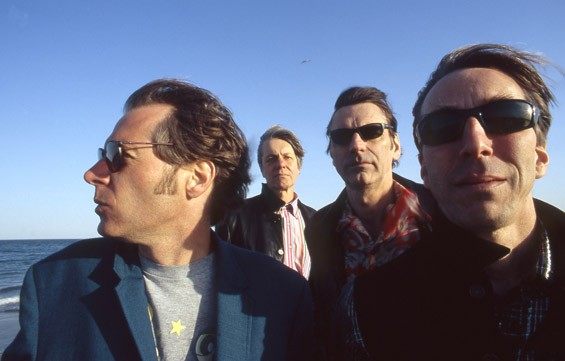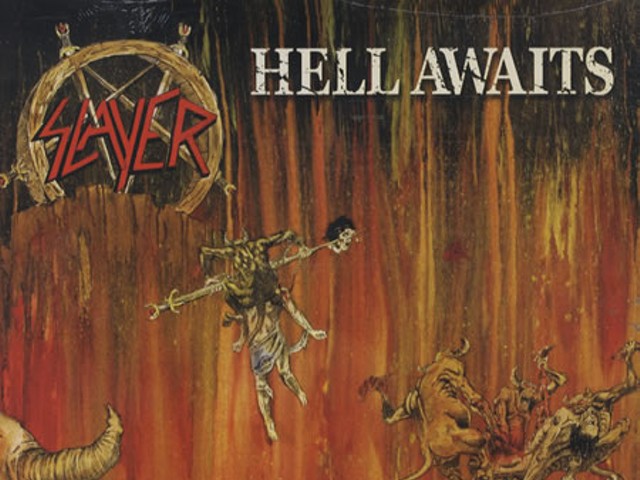According to some garage rock geeks, the Fleshtones is the greatest rock & roll band in the world. For once, the geeks may have a point. At the very least, the New York group, formed in 1976 by high school friends Keith Streng and Peter Zaremba, has come to symbolize what still matters about rock & roll: the manic spirit, the physical fun and the big, indefatigable beat of its heart. The members of the Fleshtones are survivors: They've long outlasted, as a recording and sometimes touring group, most of their peers, and they have a documentary film and biography to prove it. Reached by phone in New York, guitarist and songwriter Keith Streng looked back at the upstarts' start and looked ahead as their story still unfolds. The Fleshtones returns to St. Louis after more than a decade for a headlining set at the Beat 'n' Soul showcase at Off Broadway on Saturday, November 6.
Roy Kasten: Can you describe what your New York was like in the '70s?
Keith Streng: It was a lot of fun, a lot more wild. The rock & roll scene, as everybody knows, was exciting, new, alternative. Everything up to that time was big record companies, big budgets, nothing independent. So it was a good time to be in a rock & roll band in New York City, or to come to New York and play places like CBGB or Max's Kansas City. There weren't many clubs, you know. There were maybe just two clubs, but at least they let you perform original music. At that point, if you were in a band you had to be in a cover band to make a living. Everybody wanted to hear David Bowie or Led Zeppelin. Nobody was interested in original music at that point. The mid '70s changed all that, with the coming of bands like the Ramones, Blondie, Talking Heads and Television. We were just after that era. We were the next generation if you will of those bands in the late '70s.
Did you look up to those bands or were you looking further back?
We were already listening to a lot of records, so we had our influences. But what changed my mind about music, what really made me want to start my own band, was seeing the Ramones at CBGB before they had a record deal. It made a big impact on me. At that point I was playing drums. I'd been doing that for years. Seeing the Ramones reassured me that I should be playing guitar and writing my own songs. So they were a big influence.
I can hear the Ramones as an inspiration, but not so much from a guitar perspective.
Not a guitar perspective but a minimalism perspective. You didn't have to be a virtuoso to play rock & roll. You could be basic in your approach and play original songs. That's what they showed me in their 20-minute live shows. Back then, that's about what they would play. Everything was played at high speed and kind of sounded the same, but it was powerful and exciting. That was the lesson we learned. It doesn't take much to do a lot.
You were friends with Peter (Zaremba) in high school.
That's where we met, years before the band started. We were listening to the same bands, same records. We liked the same things, so it was inevitable. I was still a drummer, and Peter, nobody thought of him as a singer. He was playing harmonica already and was quite good, but nobody had heard him sing at that point, until the Fleshtones formed.
Chemistry is a cliché, but I also think it's true. When you have the right people, the right individuals...
The sum of all the parts does define the sound of the band, you know.
Do you remember the first recording session?
That would have been for the album Blast Off! for Red Star Records, which was owned by Marty Thau. It was in a studio called Ultima, I believe. We of course had no idea what we were doing. We were very excited to make a record. The idea that we had a record deal and were making an album was beyond anything we ever thought possible. That I remember. The first album was called Blast Off!, (laughs), and it was delayed, the release was delayed, because -- I forget what happened. Red Star Records, their backers, Bronze Records in England, pulled the budget on them, so Red Star had no money. The record sat on the shelf for years until money could be brought in to put it out.
Do you remember anything else specific about that session, aside from the fact that you didn't know what you were doing?
(Laughs) Anything specific? Well, I remember one session, Alan Vega from Suicide came in; he was the one who hooked us up with Marty. He came in to see how it was going. All of a sudden we started to jam with Alan Vega, playing a Suicide song, "Rocket USA," so it was the Fleshtones backing Alan Vega. It sounded like the Yardbirds backing him. Marty Thau, without us knowing, turned on the recorder, and recorded it. It was probably one of the highlights of the session. That sticks out in my mind.
It's been pretty hard to find those early recordings, and the I.R.S. and Ichiban recordings. But they've been reissued more recently.
Yeah, the I.R.S. stuff has been, by Raven out of Australia. Yet again, they're reissuing Hexbreaker! and Speed Connection.
Does all of that happen outside your control?
That happens outside my control. I have nothing to do with it. But it's all good, because I still see publishing money, and that's good.
One wonders when you see those imports of early soul records or garage records.
When records get re-released you'll make publishing money, if you were a songwriter, as long as you didn't sign away your rights. Whenever it gets reissued again and again, as soon as it's sold, you see money, because your name is on the publishing, the songwriting. Then of course when it gets airplay, you'll see money from the broadcast side of publishing.
Did you see a spike in interest in the Fleshtones after the documentary and biography came out?
Not much, but definitely it helped. Let's put it that way. It wasn't a spike, but there was more interest, more articles, maybe more attendance at shows. It was an improvement.
Did you see the documentary or read the book?
I think the documentary is good. It's a good representation of what we're about and why we still exist. I don't know if you saw the original documentary, a lot of it had to be cut out. People demanded money to use the footage. Jeffery (Barbier) is an independent filmmaker. He had this nice idea for a project on the Fleshtones. All of a sudden people were trying to bleed him for money that obviously he doesn't have. It wasn't a Hollywood movie. I was amazed by that. So do I like it? Yes. Have I read the book? No, I've skimmed the book. I could not imagine reading that book from page 1 to page whatever. What I've skimmed seems accurate, seems fun. The beginning is more entertaining when the band was first starting. After a while it all seems the same. Another record deal and tour that's not going right, and this or that isn't truly correct, whereas I think the intro is more fun. You get a feel for New York City in the late '70s when the band started. I think the book is fine, it's good. I'm amazed at the amount of work that Joe [Bonomo] put into it. And the story still goes on.
Are you working on a new record now?
Yes, back to what the Fleshtones are doing now. Yes, we are. We have recorded a new record for YepRoc again. The idea for this album is that we recorded the album with Lenny Kaye. He played guitar on the entire record. He was not there to produce but as second guitar. The name of the album is The Fleshtones Present the Brooklyn Sound Solution with Lenny Kaye. We still have to mix it. I'm going to mix from November 8, and hopefully Novemeber 12th we'll have an album that's ready to be mastered. The idea is to have it out mid March. That's the Fleshtones now. We will be touring, so maybe we'll be back in St. Louis. The album is half instrumental, half R&B cover songs, and some originals. It's kind of a hodge podge. It's definitely a Fleshtones album, but with a different angle.






